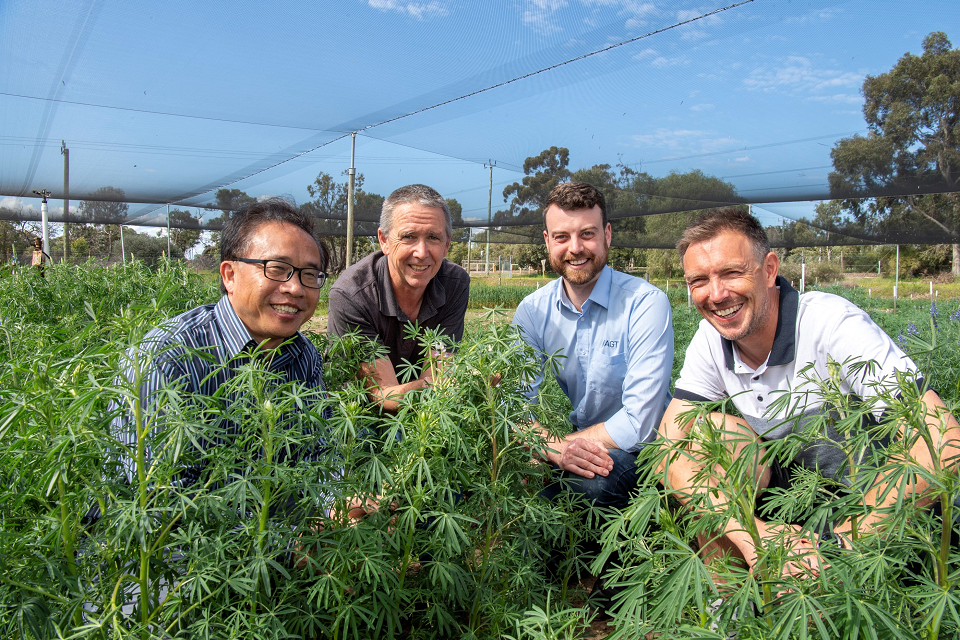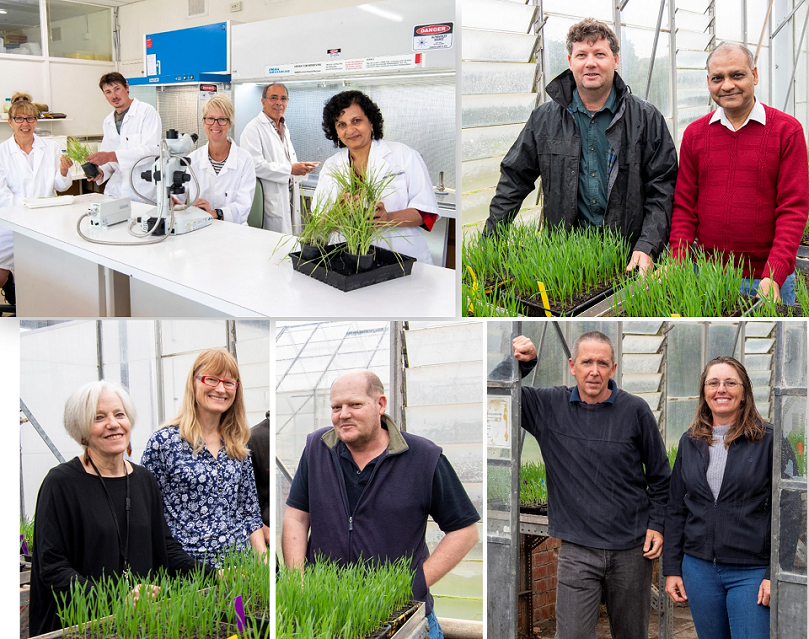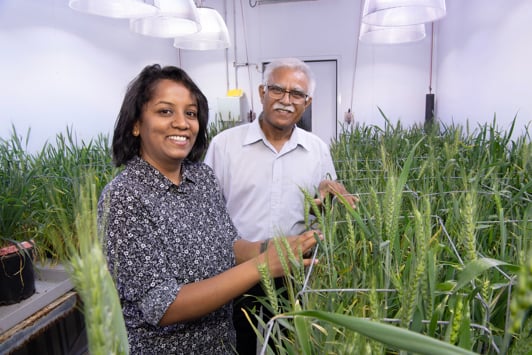Genetic improvement research is focused on wheat, barley, oats, canola, lupins, chickpea, lentil, and field pea. Research priorities include:
- Enhance abiotic stress tolerance
- Enhance disease resistance
- Enhance commercial potential (yield, quality).
- Germplasm resourcing.
- Aid technology adoption and development (image/sensor-based phenotyping; gene editing).
Priority projects
An efficient and innovative plant tissue culture program that produces wheat and barley doubled haploid (DH) lines for Australian plant breeding companies, and researchers at the department and other Australian institutions. The department also has capacity to work on other crop species.
Start date: 1993
Finish date: Ongoing

The department’s cereal doubled haploid program is well-established and delivers approximately 15,000 doubled haploid wheat and barley lines annually to breeding companies and researchers at the department and other Australian research institutions.
It is one of two wheat doubled haploid programs and the only barley doubled haploid program in Australia. The anther culture protocols for wheat and barley doubled haploid production have been developed and refined at the department over many years. Recently, several specialist doubled haploid populations, including canola and triticale, have also been developed for department researchers.
Doubled haploid production is an important tool for rapidly generating fixed lines and can save time in variety development. Department researchers have developed other culture protocols where immature pollen cells (haploid microspores) are diverted from their normal developmental pathway to one of embryogenesis and haploid plant development.
Following a chromosome-doubling step, the resulting doubled haploid or DH plants are fully fertile and 100% homozygous (fixed or true breeding) at all loci, and are valuable tools for breeding, genetic research, and gene mapping.
Funding partners
Various
Project contacts
This project aims to establish gene silencing and DNA-free gene editing platforms for Western Australia’s major grain crops, including wheat, barley, and lupin.
The biotechnological toolkit will enable rapid gene function validation and targeted mutation creation. Advanced plant materials can increase yield potential, environment adaptation and climate resilience and thus create transformable outcomes for stakeholders.
Start date: 01/05/2021
Finish date: 30/06/2025
Genetic mapping and high-throughput sequencing technologies have considerably boosted the identification of responsible genetic loci responsible for agronomic performance and stress tolerance in crops. Such knowledge further drives plant breeding innovations to precisely develop crop varieties with improved traits for specific environments.
Adopting novel biotechnologies helps unlock the genetic controls of key traits. Transient gene silencing techniques can rapidly validate the functional genes associated with trait expression. Furthermore, gene editing tools like CRISPR/Cas9 can rewrite genomic regions with unprecedented accuracy and efficiency. Gene editing has been successfully applied to improve plant yield potential, grain quality, nutrient use efficiency, and disease/herbicide resistance in major cereal and horticultural crops.
This project will explore and adopt gene silencing and editing technologies for wheat, barley, and lupin to accelerate functional genomics and genetic improvement.
The project serves as proof of concept for efficient and targeted trait improvement using CRISPR technology and the toolkit can dramatically enhance precise crop breeding. The generated mutants with altered performance in yield, flowering, or herbicide resistance will be precious genetic resources for breeding programs.
Funding source
Royalties for Regions
Project contacts
This project will provide breeders access to improved vegetative cold and reproductive chilling tolerant chickpea lines and high throughput screening techniques and diagnostic molecular markers.
Start date: 01/06/2023
Finish date: 31/12/2026

The occurrence of chilling stress (mean daily temperature of less than 15o Celsius) at flowering is major constraint to improving the yield and profitability of chickpea in existing and expansion target production environments in Australia.
Chilling stress at flowering disrupts fertilisation and pod set and delays the reproductive phase of chickpea. This delay exposes the plant to greater heat and drought stress, decreasing yield and increasing grower risk.
Australian chickpea growers and breeding programs have long recognised low temperature stress as a major contributor to yield instability and an important target for genetic improvement.
This project will build on previous projects that identified lines possessing superior chilling tolerance in wild relatives of chickpea.
The aims of the project are to:
- screen segregating populations derived from crosses between wild parents identified as possessing chilling tolerance and commercial chickpea cultivars under field conditions at Dale, Western Australia.
- establish a high throughput (HTP) screening assay that is scalable, accurate and reproduces field rankings of chickpea germplasm for chilling tolerance.
- develop genetic diagnostic markers for chilling tolerance in chickpea to assist with selecting enhanced cold tolerant germplasm for use in breeding programs.
Funding partner
GRDC
Project code
DAW2305-003RTX
Project contacts
This project will provide lupin breeders and researchers with the genetic tools and knowledge to deliver lupin varieties with improved disease and yield stability.
Start date: 01/05/2023
Finish date: 30/06/2028

This project, a collaboration between the department, Murdoch University, Curtin University, and Australian Grain Technologies (AGT), aims to improve the disease resistance of narrow leafed lupin to 4 prominent diseases.
This 5-year project will screen and genotype a core set of germplasm selected from cultivars, breeding lines, and wild introductions to identify resistance genes to Phomopsis, cucumber mosaic virus, anthracnose and Sclerotinia.
The project will develop high throughput phenotyping methods, deploying traditional methodologies, artificial intelligence, and molecular techniques to provide effective and robust screening tools for breeding companies and researchers.
Genomic selection, modelling tools and genomic data will be used to select resistant lines and develop markers for marker assisted selection, to be able to pyramid resistance genes into elite cultivars.
The outputs from this project will be shared with prebreeders and breeders to reduce the impacts of these diseases on the narrow-leafed lupin industry.
Funding partner
GRDC
Project code
DAW2305-006RTX B
Project contacts
This project will deliver wheat pre-breeding lines with at least 10% higher yield than the current highest yielding cultivars under heat stress during grain filling.
Start date: 1/01/2022
Finish date: 31/12/2026
Heat stress is a significant constraint to wheat yield potential and the frequency of occurrence and intensity is projected to increase with climate variability.
Australian grain growers mitigate the impacts of heat stress by optimising sowing time, when possible, input use, and variety choice to avoid both frost and heat stress induced loss of yield.
Wheat varieties with improved heat tolerance would give grain growers more flexibility while maintaining yield potential in a warmer climate.
This project, a collaboration between the department, University of Sydney, Agriculture Victoria and InterGrain aims to improve heat tolerance of upcoming wheat varieties.
This project will enrich wheat lines for heat tolerance at grain filling based on genomic predictions and field-based phenotypes in at least 5 key environments and deliver wheat breeders with genomic information for selection.
The strategy will build on semi-dwarf heat tolerant germplasm, which is already competitive for yield with current cultivars and has a phenology range consistent with that required across the Australian wheatbelt.
Intensive validation of heat responses at 5 key national locations and extensive concurrent testing at 40 sites in lnterGrain's national trial network will assign value to the new sources of heat tolerance.
These new lines will be enriched for heat tolerance at grain filling and delivered to wheat breeders with genomic information to aid selection and incorporation of tolerance into new varieties.
Funding source
GRDC
Project code
UOS2201-001RTX (CT35378)
Project contacts
This project aims to provide continued access for growers and breeders to independent, accurate, consistent, and timely source of comparative, disease resistance data on commercially available cultivars and NVT lines to assist in variety decision making.
The ultimate outcome will be increased competitiveness and profitability of agri-industry for export-focused wheat, barley, oat, lupin, and chickpea production through enhanced delivery of varieties genetically superior for disease resistance.

This project will generate independent, robust, and reliable resistance and/or tolerance ratings of crop diseases of significance for commercial and pre-commercial lines, along with other national service providers.
Services will produce and compile the raw data required to generate comparative disease resistance/tolerance results on commercial and pre-commercial cultivars.
The project will be conducted in line with the National Variety Trials (NVT) protocols and the disease rating standard operating procedures, and trials managed in accordance with the agreed implementation plan.
Disease ratings will be generated on approximately 350 cultivars across 67 diseases of importance included in the NVT Disease Rating program.
The department’s team of researchers will assess NVT nominations and/or released varieties of wheat, barley, oat, lupin, and chickpea and screen in Western Australia for the following diseases:
- Wheat foliar: Leaf rust, stem rust, stripe rust, yellow spot, nodorum blotch, septoria tritici blotch, and powdery mildew
- Barley foliar: Powdery mildew, leaf rust, net form net blotch, spot form net blotch, scald, and barley yellow dwarf virus (BYDV)
- Oat: BYDV, leaf/crown rust, Septoria blotch, and stem rust
- Lupin: Anthracnose, cucumber mosaic virus, bean yellow mosaic virus, Phomopsis, and Sclerotinia stem rot
- Chickpea: Ascochyta blight
- Nematode: Root lesion nematode Pratylenchus quasitereoides on wheat and barley.
The department will lead and manage the following components of the project:
- Wheat and oat - Dr Manisha Shankar, Principal Plant Pathologist
- Lupin and chickpea - Geoff Thomas, Principal Plant Pathologist
- Nematode - Carla Wilkinson, Nematology Research Scientist
The barley component will be led and managed by Dr Sanjiv Gupta, Associate Professor, Murdoch University.
Funding partner
GRDC
Project code
DAW2403-004SAX_NVT

